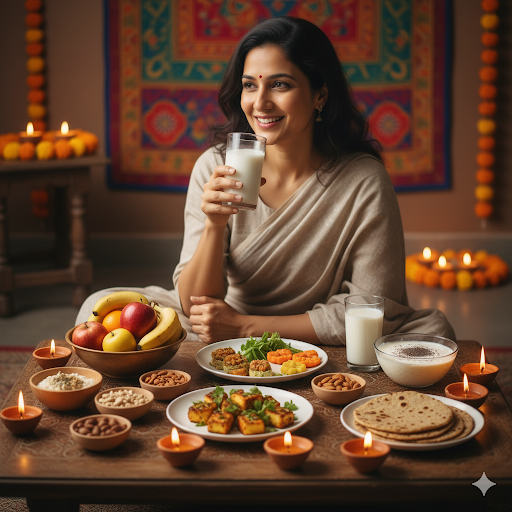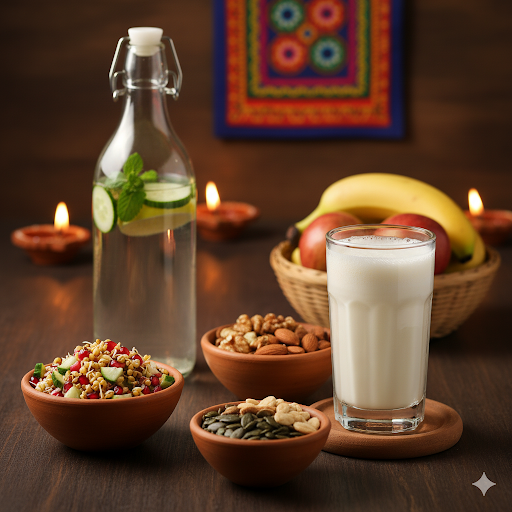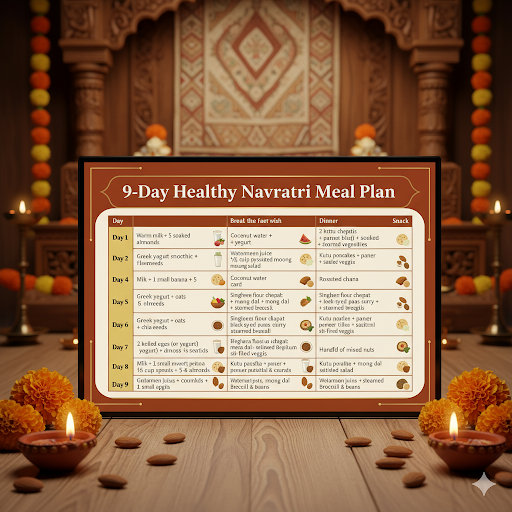Navratri is one of the most widely celebrated festivals in India, marked by devotion, dance, and fasting. Millions of people observe fasts during these nine days, often avoiding grains, certain vegetables, or specific foods. While fasting is spiritually fulfilling, it’s equally important to pay attention to what you eat to stay energized, healthy, and focused during this period.

Why Healthy Eating Matters During Navratri
Fasting can help in detoxifying the body, improving digestion, and promoting mindful eating. However, if you only rely on fried or sugary foods to break your fast, it can lead to energy crashes, digestive discomfort, or nutrient deficiencies.This mirrors the same risks associated with rapid weight loss approaches, which can cause metabolic disruption and muscle loss when nutrition isn’t properly balanced.Eating the right foods ensures your body gets enough vitamins, minerals, and energy to sustain daily activities, prayers, and celebrations.
Tips for Eating Right During Navratri
1. Plan Your Meals
Start with a nutritious first meal before the fasting period and plan a balanced break-the-fast meal. This helps your body get sustained energy and prevents overeating at night.
2. Include a Variety of Foods
Balance your meals with a mix of:
- Milk, yogurt, paneer, legumes – understanding the role of protein in weight management becomes especially important during fasting periods to prevent muscle loss and maintain metabolism.
- Healthy carbs: Buckwheat (kuttu), water chestnut flour (singhara), sweet potatoes
- Fruits and vegetables: Cucumber, carrots, spinach, berries
Variety ensures your body gets a full range of nutrients while keeping meals interesting.
3. Hydrate Well
Drinking enough water, coconut water, or herbal teas throughout the fasting period is essential. Proper hydration improves digestion, prevents fatigue, and helps your body feel refreshed.
4. Limit Fried and Sugary Foods
Samosas, pakoras, or sweets are tempting during Navratri, but consuming them in excess can cause digestive issues, energy crashes, and unnecessary calorie intake. Instead, opt for baked or steamed versions of fasting-friendly foods.
5. Eat Mindfully
Take time to enjoy your meals. Eating slowly, focusing on whole foods, and avoiding processed items helps with digestion and keeps you feeling full longer.
6. Include Energy-Boosting Snacks
Snacks like roasted nuts, sprouts, or fruit can be part of your break-the-fast meal to prevent fatigue during the day.

9-Day Healthy Navratri Meal Plan

Day 1
First Meal: Warm milk (200 ml) + 5 soaked almonds
Break the Fast with: Coconut water + yogurt (100 g)
Dinner: 2 kuttu chapatis + paneer bhurji + steamed vegetables
Snack: Roasted pumpkin seeds (30 g)
Day 2
First Meal: Greek yogurt smoothie with strawberries + flaxseeds
Break the Fast with: Watermelon juice + ½ cup sprouted moong salad
Dinner: Singhara flour chapati + moong dal + sautéed veggies
Snack: Handful of walnuts
Day 3
First Meal: Milk (200 ml) + 1 small banana + 5 almonds
Break the Fast with: Coconut water + curd
Dinner: Kuttu pancakes stuffed with paneer and veggies + side salad
Snack: Roasted chana (30 g)
Day 4
First Meal: Greek yogurt with oats (fasting-friendly oats) + chia seeds
Break the Fast with: Sweet potato slices + coconut water
Dinner: Singhara flour chapati + black-eyed peas curry + steamed broccoli
Snack: Almonds and pumpkin seeds mix
Day 5
First Meal: Milkshake with banana + 1 tsp peanut butter
Break the Fast with: Cucumber and tomato salad + yogurt
Dinner: Kuttu noodles + paneer tikka + stir-fried veggies
Snack: Roasted chana or walnuts
Day 6
First Meal: 2 boiled eggs (if allowed) or ½ cup Greek yogurt + soaked almonds
Break the Fast with: Watermelon juice + sprouts salad
Dinner: Singhara flour chapati + moong dal + sautéed capsicum and beans
Snack: Roasted pumpkin seeds
Day 7
First Meal: Milk + 1 small sweet potato + flaxseeds
Break the Fast with: Coconut water + ½ cup sprouts + 5-6 almonds
Dinner: Kuttu paratha stuffed with paneer + sautéed veggies
Snack: Handful of mixed nuts
Day 8
First Meal: Greek yogurt smoothie with papaya + chia seeds
Break the Fast with: Coconut water + ½ cup sprouted chickpeas
Dinner: Singhara flour chapati + paneer curry + sautéed zucchini and carrots
Snack: Almonds or walnuts (30 g)
Day 9
First Meal: Milk (200 ml) + soaked almonds + 1 small apple
Break the Fast with: Watermelon juice + cucumber salad
Dinner: Kuttu pancakes with moong dal stuffing + steamed broccoli and beans
Snack: Roasted pumpkin seeds (30 g)
Key Takeaways
- Prioritize protein to maintain muscle during fasting.
- Stay hydrated with water, coconut water, and herbal teas.
- Include a variety of protein sources—dairy, legumes, nuts, seeds, soy.For those following vegetarian fasting practices, our comprehensive 7-day Indian vegetarian diet plan offers additional protein-rich meal ideas that can be adapted for post-Navratri healthy eating.
- Combine carbs with protein for sustained energy.
- Gentle yoga or stretching can stimulate muscles without overexertion.
- Balanced meals prevent energy crashes and keep you full throughout the day.
By following this 9-day Navratri diet, you can honor your fasts, protect your muscles, stay energized, and enjoy the festival while maintaining good health.





